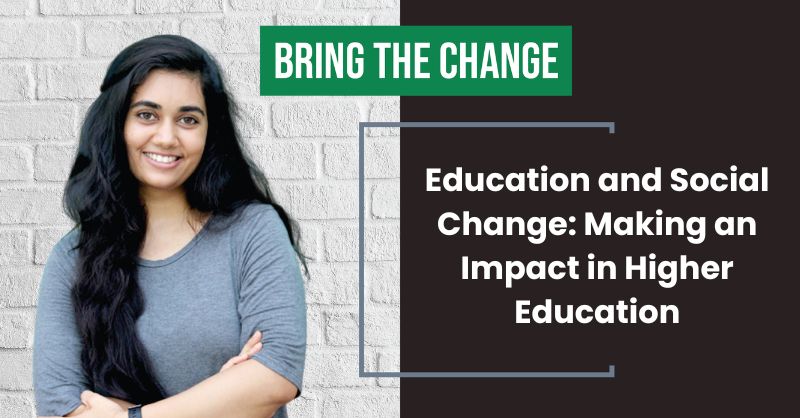In the ever-evolving landscape of higher education, Role of Education in Social Change extends far beyond the transmission of knowledge and the attainment of degrees. Today, universities and colleges play a pivotal role in shaping society, driving progress, and fostering positive social change.
In this exploration, we delve into how education influences and contributes to social change. We learn how educators, administrators, and students collectively engage in initiatives beyond the classroom, impacting communities, economies, and the global landscape. From advancing social justice and equality to promoting sustainability and innovation, this discourse underscores the immense potential that higher education holds in creating a better, more equitable world.
The Role of Education in Social Change
The role of education in social change is profound and multifaceted. Education is a powerful tool for shaping minds, fostering critical thinking, and driving societal transformative shifts. Here, we explore the crucial ways in which education contributes to and catalyzes social change.
- Awareness and Consciousness: Education raises awareness about social issues, injustices, and inequalities. It gives individuals the knowledge and understanding to recognize societal problems and challenges. Informed citizens are more likely to discuss social change and advocate for meaningful solutions.
- Empowerment: Education empowers individuals to take action. Educated people are more likely to engage in civic activities, join advocacy groups, and participate in social and political movements. Education equips individuals with the tools and confidence to effect change.
- Promoting Equity: Education has the potential to bridge social and economic gaps. Access to quality education can mitigate disparities in income, employment opportunities, and social mobility. Societies can achieve more significant equity and inclusivity by providing equal educational opportunities.
- Social Innovation: Educational institutions are hubs for innovation and research. They drive the development of new ideas, technologies, and solutions to pressing social challenges. Study conducted in academic settings often leads to breakthroughs that address societal issues, from healthcare advancements to environmental sustainability.
- Cultural Transformation: Education fosters cultural understanding and appreciation. Exposure to diverse perspectives and cultures through education promotes tolerance, empathy, and a sense of global citizenship. This, in turn, contributes to a more inclusive and harmonious society.
- Leadership Development: Educational institutions cultivate future leaders. By nurturing leadership qualities and skills, education prepares individuals to assume roles in government, nonprofits, businesses, and other sectors where they can influence policies and initiatives that drive social change.
Education as a Social Change Tool
Education is a potent tool for driving social change. It catalyses transforming societies, fostering progress, and addressing pressing social issues. Here, we explore the role of education as a dynamic force for positive social change.
- Promoting Inclusivity: Access to quality education promotes inclusivity and reduces social and economic disparities. It ensures that individuals from diverse backgrounds have equal opportunities to succeed and contribute to society.
- Advancing Social Justice: Education is a tool for advancing social justice. It equips individuals with the tools to advocate for the rights of marginalised groups, challenge discrimination, and promote equality.
- Cultivating Critical Thinking: Educational environments foster critical thinking and analytical skills. These abilities are essential for evaluating social policies, questioning the status quo, and developing innovative solutions to complex societal challenges.
- Gender Equality: Education is a crucial driver of gender equality. When girls and women have equal access to education, it can challenge traditional gender roles and empower them economically and socially.
- Technological Advancement: Education is essential for adapting to technological advancements. It prepares individuals for the job market and helps societies harness the benefits of innovation.
Impact of Social Change on Education
The impact of social change on education is profound and multifaceted. Education is both a reflection of societal shifts and a driving force for further change. Here are several ways in which social change influences and is influenced by the education system:
- Curriculum and Content:
- Societies evolve, and new knowledge, technologies, and societal challenges Social change often necessitates updates to the educational curricula. As emerge, prompting the inclusion of relevant content in educational programs.
- Curriculum changes may reflect shifts in values, such as incorporating environmental education or promoting diversity and inclusion.
- Teaching Methods and Pedagogy:
- Societal developments often drive advances in technology and changes in pedagogical approaches. The digital age, for example, has prompted a shift towards more technology-enhanced and online learning.
- Pedagogical changes also address diverse learning needs and styles, catering to students from different cultural backgrounds or with varying abilities.
- Access and Inclusivity:
- Social change can lead to greater awareness of the importance of education and the need for equal access. Movements for gender equality, disability rights, and minority rights have all influenced efforts to make education more inclusive and accessible.
- Diversity and Inclusion:
- Social change promotes diversity and inclusion within educational institutions. Efforts to reflect the diversity of society in classrooms and curricula have been driven by changing demographics and a growing recognition of the benefits of a multicultural educational experience.
- Values and Ethics:
- Social change can prompt discussions about values and ethics in education. For example, debates about inclusivity, equity, and the role of education in addressing societal inequalities are all influenced by changing social norms and values.
Education is not static but a dynamic system that responds to and shapes social change. The reciprocal relationship between education and society underscores the importance of an adaptable and responsive educational design that equips individuals with the knowledge and skills to navigate an ever-changing world.
In sum, education is a means of personal growth and a tool for societal transformation. It empowers individuals to challenge the status quo, advocate for social justice, and work collectively toward a more equitable, inclusive, and progressive world. As we harness the power of education, we take significant steps toward positive social change and a brighter future for all.

